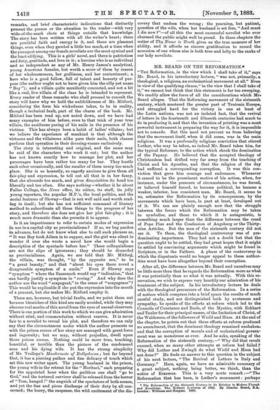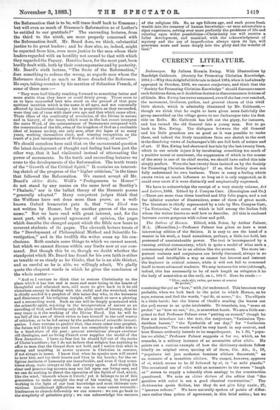MR. BEARD ON THE REFORMATION.*
"THE Reformation, in the view which I shall take of it," says Mr. Beard, in his introductory lecture, " was not, primarily, a theological, a religions, an ecclesiastical movement at all." Even in view of the qualifying clause," in the view that I shall take of it," we cannot but think that this statement is far too sweeping. We readily allow the force of all the considerations which Mr. Beard alleges. That the Reforming movement of the sixteenth century, which mastered the greater part of Teutonic Europe, and struggled hard for the victory in one at least of the Latin nations, was not an isolated fact, that the revival of letters in the fourteenth and fifteenth centuries had much to do in producing it, and that the invention of printing was a most powerful instrument in preparing the way for it, it is impossible not to concede. But this need not prevent us from believing that the movement itself, when it did come, was in the main religious. It was a profoundly religious conviction that stirred Luther, who may be taken, as indeed Mr. Beard takes him, for the typical Reformer, to the action which shook the domination of the Papacy. He believed that the accepted theology of Christendom had drifted very far away from the teaching of Christ and his Apostles, and that the religion of the day had suffered a corresponding corruption. It was this con- viction that gave him courage and endurance. Whenever it ceased to be the prominent motive of his action, when, for instance, under the pressure of circumstances, he was forced, or believed himself forced, to become political, he became a weaker, inferior, less consistent man. Mr. Beard, it seems to us, estimates the Reformation by its consequences, by the movements which have been, in part at least, developed out of it. We can see plainly enough now that the struggle between the forces which the Reformation may be taken to symbolise, and those to which it is antagonistic, is something much larger than the difference between the creed of Pope Pius and the Confession of Augsburg or the Thirty- nine Articles. But the men of the sixteenth century did not see it. To them, the theological controversy was of pre- dominating importance. They had not a doubt but that the question ought to be settled, they had great hopes that it might be settled by convincing arguments which might be found in Scripture, or in the Fathers. A phase of the controversy in which the disputants would. no longer appeal to these author- ities must have been altogether beyond their conception.
After all, the difference between Mr. Beard and ourselves may be little more than that he regards the Reformation more as what it was potentially than as what it was actually. With this re- servation, we wish to express very heartily our admiration of his treatment of the subject. In his introductory lecture he deals with the theological precursors of the Reformation. In a series of notices which compress into a brief space the results of much careful study, and are distinguished both by acuteness and sympathy, he speaks of the efforts at reform which led to the Councils of Constance and Basle, of the Mystics, with Eckhart and Tanler for their principal names, of the Imitation of Christ, of the Waldenses, of the followers of Wiclif and Huss. At the end. of the chapter, he points out that these efforts at reform produced. no amendment, that the dominant theology remained unshaken, and that the corruption of morals and of ecclesiastical govern- ment was as monstrous as ever. And he asks, speaking of the Reformation of the sixteenth century,—" Why did that revolt succeed, when so many other attempts at reform had failed Why did Luther and Zwingli do what Wiclif and Huss had not done ?" He finds an answer to this question in the subject of his next lecture, " The Revival of Letters in Italy and Germany." Here, again, we have an admirable summary of a great subject, nothing being better, we think, than the notice of Erasmus. This is a very acute remark :—"The Reformation that has been, is Luther's monument : perhaps • The Reformation of the Sixteenth Century in its Relation to Modern Though and Knowledge. The Hibbert le.otrirea of 1883. By Oharlea Beard, B.A. London : William and Norgate. 1883.
the Reformation that is to be, will trace itself back to Erasmus ; but will even as much of Erasmus's Reformation as of Luther's be entitled to our gratitude?" The succeeding lectures, from the third to the ninth, are more properly concerned with the Reformation itself. Mr. Beard does, we think, substantial justice to its great leaders ; and he does also, as, indeed, might be expected from him, even more justice to the men whom their leaders regarded with an hostility not second to that with which they regarded the Papacy. Heretics have, for the most part, been hardly dealt with, both by their contemporaries and by posterity.
Mr. Beard's sixth lecture, "The Sects of the Reformation," does something to redress the wrong, as regards men whom the
Reformers dreaded as much as Rome dreaded the Reformers. He says, taking occasion by his mention of Sebastian Franck, of some of these men :— " They were half-blindly reaching forward to something better and more stable than they knew or could firmly grasp. Those seem to us to have succeeded best who stood on the ground of that pure spiritual intuition which is the same in all ages, and not essentially affected by intellectual change ; but in proportion as they succeeded, were they out of tone with their own age and that which came after. These ideas of the continuity of revelation, of the Divine in nature and in history, of the inner, which must in the last resort interpret the outer Word, of the unimportance of Sacraments compared with the consecration of the life, even of the kingdom of God as a realisable ideal of human society, are only now, after the lapse of so many years, working themselves clear, and winning recognition as the result of a just interpretation of gcripture, of history, of nature."
We should ourselves have said that on the sacramental question the latest development of thought and feeling had been just the other way, that it had vindicated instead of attenuating the power of sacraments. In the tenth and succeeding lectures we come to the developments of the Reformation. The tenth treats of the " Growth of the Critical Spirit." It contains an interest- ing sketch of the progress of the " higher criticism," in the times
that followed the Reformation. We cannot accept all Mr. Beard's obiter dicta. Wolf's " Prolegomena to Homer "
do not stand by any means on the same level as Bentley's " Phalaris," nor is the ballad theory of the Homeric poems "generally adopted." Many competent judges think that the Wolfians have not done more than prove, as a well-
known Oxford humourist puts it, that "the Iliad was not written by Homer, but by another person of the same
name." But we have read with great interest, and, for the most part, with a general agreement of opinion, the pages which describe the changed aspect which the Bible now bears to reverent students of its pages. The eleventh lecture treats of the " Development of Philosophical Method and Scientific In- vestigation," and in the twelfth the writer sums up his con- clusions. Both contain some things to which we cannot assent, but which we cannot discuss within any limits now at our com- mand. But though this be so, though we doubt whether the standpoint which Mr. Beard has found for his own faith is either as tenable or as steady as he thinks, that he is an able thinker, and as careful as he is able, we willingly admit. We gladly quote the eloquent words in which he gives the conclusion of the whole matter :—
" And so I venture to think that to restore Christianity to the place which it has lost and is more and more losing in the hearts of thoughtful and educated men, still more to give back to it its old victorious energy in dealing with the sinful and the wretched, what is chiefly needed is a prophet of this latter day who, in the keenness and directness of his religions insight, will speak at once a pierciug and a reconciling word. Such an one will be deeply penetrated with the scientific spirit, rejoicing in the interpretation of nature as an unveiling of God, and desiring only the plain truth of history, that he may trace in it the working of the Divine Hand. But he will be too full of the awe of direct vision to lose himself in the arid wastes of criticism, or to be led astray by the pedantries of scientific investi- gation. I dare venture to predict that, like every other true prophet, the future will fill his eye and heart too completely to suffer him to be a bond-slave of the past : present revelations always overbear old theologies, and no living Church ever supplies the model of the New. Jerusalem. I have no fear lest he should fall out of the ranks of Christ's soldiers ; for I do not believe that religion has anything to offer to man that the Gospel does not hold, and I notice that what is strong and inspiring in newer systems is Christian in essence, if not always in name. I know that when he speaks men will crowd to hear him, and lay their hearts and lives in his hands ; for the re- ligions instincts of humanity are ineradicable, and even if they some- times sleep, wake always to life and energy again. And though his clear and penetrating accents may not fall upon our living ears, and we can do nothing to direct the operation of the Spirit of God, which, like the wind, ` bloweth where it listeth,' yet it belongs to us of this generation to make straight the way of his coming, by living and working in the light of our best knowledge and most intimate con- victions. Intellectual difficulties we can to some extent reconcile : hindrances to church-fellowship we can remove : we can go back to the simplicity of primitive piety ; we can acknowledge the oneness of the religious life. So, as age follows age, and each pours fresh wealth into the treasury of human knowledge—as men accumulate a riper experience, solving ever more perfectly the problems of life and entering upon wider possibilities—Christianity too will receive a fuller development, and mankind, with the acknowledgment of mystery and the cry of imperfection always upon its lips, will penetrate more and more deeply into the glory and the wonder of God."







































 Previous page
Previous page